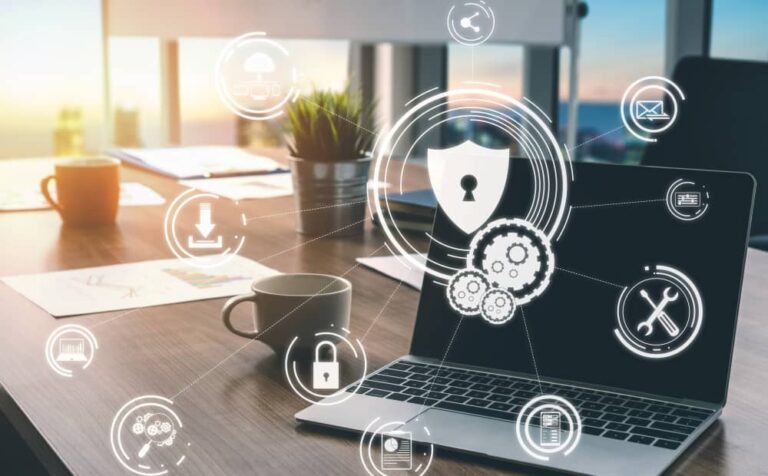Over the past decade, technology and the internet have experienced tremendous growth, proving an essential asset for small businesses globally. It has helped increase sales, attract customers, and promote brand coverage and recognition.
However, it has also brought an array of cyber threats that put many businesses at risk of losing clients or closure. These threats are usually more likely to affect small businesses because, unlike big corporations, they lack the resources and infrastructure to protect themselves.
Below is a guide on cyber threats small businesses should prepare for and how to implement cyber security.
What Is Cyber Security?
Today’s electronic systems and networks are incredibly complex, with millions of parts and pieces, each susceptible to attack. If a cyber hacker can get into an electronic system, they could steal sensitive data or disrupt the smooth operation of a business or government agency. Cyber security professionals focus on protecting hardware and software from malicious acts or unauthorized access in both physical and virtual environments.
- Network security– This protects a computer network from unwanted users, intrusions, and attacks. The solutions include access and data controls like Identity Access Management (IAM), Data Loss Prevention (DLP), Next-Generation Firewall (NGFW), and Network Access Control (NAC). There are also advanced, multi-layered solutions like Intrusion Prevention Systems (IPS) and Content Disarm and Reconstruction (CDR).
- Cloud Security– Many small businesses are moving towards storing their data on the cloud instead of physical devices. Cloud security strategies involve cyber security controls, solutions, services, and policies that protect the business’s cloud infrastructure, data, and applications.
- Application security– This protects apps from bot attacks or malicious interactions with APIs and other applications. Application security begins at the design phase, but regular testing and upgrades allow businesses to identify weak points and introduce new security features.
- Endpoint security– Remote access is an essential part of a business and also presents a data weak point. Endpoint security protects remote access to the enterprise’s network from third parties. They can use devices like laptops and desktops with network and data security controls, advanced threat protection like anti-phishing, and technologies offering forensics like endpoint detection and response solutions.
- Information security– This protects the privacy and integrity of data in storage and transit. It protects data from third-party and unauthorized access or changes.
- Operational security– This includes decisions and processes for protecting and handling data assets. It involves the permissions users have to access a network and the procedures determining when and where the data will be shared and stored.
- Mobile security– This is often overlooked, but mobile devices with access to corporate information expose the business to attacks. Mobile security protects mobile devices and their operating systems from jailbreaking and tooting.
- Disaster recovery and business continuity– This determines how a business responds and recovers from a cyber attack or other events that result in data and operation loss.
- – This protects apps from bot attacks or malicious interactions with APIs and other applications. Application security begins at the design phase, but regular testing and upgrades allow businesses to identify weak points and introduce new security features.
Why Is Cyber Security So Important?
Cyberattacks risk a business’s equipment, data, money, and operations. With the increased adoption of remote working, many businesses depend on their servers and cloud-based technology to transfer and store information, communicate with each other and clients, hold meetings, transact funds, sell, and buy.
This exposes them to more chances of cyber threats. Below are some benefits of incorporating cybersecurity efforts in a business.
- Restricts unwanted access – Without the proper protection, cyber attackers can use different methods to break into the enterprise’s servers and clouds. They can access sensitive information like customer lists and information, the business’s financial information, business growth plans, product designs, pricing structures, manufacturing processes, and other intellectual property.
- Prevents external and internal threats – There are so many cyber attacks, with cyber attackers developing new ones daily. Robust cyber security features in the business system block such attacks and alert the business of any attempts, ensuring they remain one step ahead.
- Regulation compliance – Many regulatory bodies, like HIPAA, GDPR, PCI DDS, and SOX, continuously implement safety standards to protect businesses and their customers.
- Improved productivity – Cyber attacks or property damage can slow down or halt business operations, resulting in tremendous losses. Cyber security ensures that a business is prepared for the attacks and has a plan to restore operations after an attack or property damage.
- Better brand reputation – Before transacting with any business, clients usually consider how safe their information will be. A company with a robust cyber security system and minimal to no security incidences is more likely to attract new customers and retain old ones.
What Is The Impact Of Cyberattacks?
Cyber attacks can come from different places like business competitors, criminals, clients of the business, or current and former employees. Accessing, corrupting, exposing, or destroying a business’ records could result in the following consequences.
- Financial loss from stealing money and the business or client’s banking information or business disruption
- Business loss from loss of clients
- Increased costs trying to restore damaged or lost information and equipment, plus improving the network
What Kind Of Cyber Security Threats Are There?
-
Malware – This is the most common cyber security threat. It is malicious software a hacker or cyber criminal creates to damage or disrupt the targeted computer or computer network. Attackers mainly spread malware through legitimate-looking downloads or unsolicited email attachments. Below are the most common types of malware used today.
- Viruses– This is a self-replicating program, attaching itself to clean files. It then spreads across a computer system and infects the files with malicious codes.
- Trojans– Attackers disguise this malware as legitimate software, then trick targets into uploading them onto their computers. They are often used to collect data or damage a network.
- Spyware– This is a program attackers use to secretly record what a computer user does. They can use this information against the business.
- Ransomware– This malware locks down the files and data on a target computer or computer network. Attackers then threaten to erase the information unless the user pays a certain amount.
- Adware– This is advertising software that attackers use to spread other forms of malware.
- Botnets– These are malware networks that cybercriminals use to conduct tasks online via a business’s network with the business’s knowledge.
- SQL injections – A Structured Language Query (SQL) injection is a cyber attack that cybercriminals use to steal and take control of data from a business’s database. They use data-driven applications’ weaknesses to inject malicious codes into the database using malicious SQL statements, gaining access to sensitive information.
- Phishing – This is one cyberattack that has become popular over the past few years. Cybercriminals use emails that resemble those from legitimate companies asking for users’ sensitive information. Cyberattackers use this method mostly to gain users’ credit card information, addresses, or bank information.
- Man-in-the-middle attacks – In this cyberattack, cybercriminals intercept information between a business and others like colleagues, clients, suppliers, or shareholders, stealing sensitive information.
- Denial-of-service attack – In this attack, cybercriminals overwhelm a business’s servers and networks with traffic, preventing the computer system from completing legitimate requests. That makes the system unusable, halting business operations.
How Can I Protect My Business From Cyber Security Threats?
-
Train your employees – While a business might have many cyber security systems, employees are among the most vulnerable business assets. Statistics show that many cyberattacks happen because employees intentionally or unintentionally give cyber attackers access to business networks and servers.
Employees might accidentally open malicious emails or download malicious apps or software. They might also lose their work phones, tablets, or computers, disclosing login credentials or sensitive information.
Therefore, businesses need to invest in cybersecurity training for their employees. This way, they understand different attacks, how they happen, and how to avoid them.
- Encrypt information – Encryption protects information in transit and storage by transforming it into unreadable codes. This way, it remains useless to unauthorized users who access it because they lack the keys to decipher it.
- Use antivirus software – Good antivirus software should protect a business from spyware, viruses, ransomware, and phishing attempts. It should also clean devices and restore them to per-infected states. Businesses should ensure they regularly update the software to maintain its effectiveness.
- Use strong passwords – Strong passwords are at least 15 characters long and contain upper-case and lower-case letters, symbols, and numbers. Businesses should have a policy for employees to change their passwords after a certain period, for example, quarterly. While having unique passwords for every account or device is essential, remembering them can be challenging. Therefore, it is necessary to have password managers to store the passwords.
- Use VPN – A Virtual Private Network is a safe way for employees to access the company’s network when working remotely. It is also useful when accessing data using public Wi-Fi.
- Have a firewall – This helps protect software and hardware. It blocks or deters viruses from getting into the network, blocks certain websites to block hackers, and restricts the transmission of sensitive information from the business’ network.
- Limit access to sensitive information – While employees promise loyalty to a business, the best way to minimize the chances of unauthorized third parties accessing sensitive information is to limit the people who can access it. Businesses should also have a system to track who accesses the information at what time. That way, tracking malicious activities is easier, increasing accountability.
- Update business software and apps – Regularly testing and updating business software and applications helps businesses identify and improve any weak spots.
- Backup information regularly – Some cyberattacks usually result in data loss which could result in business closure. In addition to having physical data storage, businesses should have could storage as a backup. To ensure they always remember to back up the information, they should have a system to do it at scheduled times automatically.
Cybersecurity Solutions for Small Businesses
Cybersecurity should be a top priority for small businesses. By implementing the solutions mentioned in this post, small business owners can significantly reduce the risks of cyber threats and protect their businesses and customers’ sensitive data. It’s crucial to continuously stay informed about the latest threats and solutions to keep up with the ever-evolving cybersecurity landscape. By investing in cybersecurity solutions, small businesses can safeguard their reputation and finances and focus on growing their business without worrying about cyber threats. Working with an experienced Cyber Security company can help you reduce your risk.





